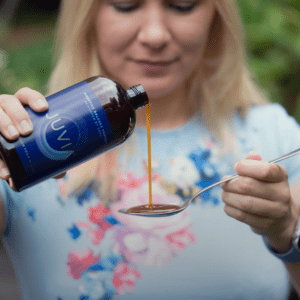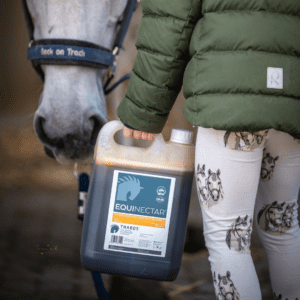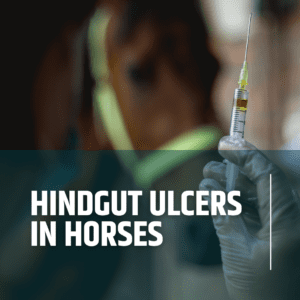
By Dr Rosemary Waring
Chief Science Officer / Tharos Co-Founder
Why does eating grass make my horse irritable?
Originally published 5th May 2023, updated 18th March 2024
01
Introduction
My name is Dr Rosemary Waring. I have spent my career as a toxicologist, doing research and teaching while being on international committees such as EFSA (European Food Safety Authority) and PRiF (Pesticide Residues in Food) in the UK.
Toxicologists study the reasons why cells die, and I have looked at the interactions of environmental compounds with human tissues. I have a particular interest in digestion and the chemicals produced by the gut microbiome. - when this complex mix of bacteria, viruses and fungi goes off-balance, a variety of toxic compounds are produced, which can lead to illness or poor functioning.
02
Our research
Our original work to develop EquiNectar was focused on the metabolites of digestion in performance horses. We discovered something interesting - horses have relatively low levels of an enzyme called amylase, which breaks down starch. If horses are fed a lot of starch, most of it goes down to the hindgut, where it is fermented by 'bad' bacteria - we have managed to identify some of the bacteria and toxins that are involved.
We then started to look at horses fed a low starch diet that were largely pasture fed. Similar situations to overfeeding of starch can happen when the grass grows quickly or is particularly high in fructans, which are polymers of fructose. The gut can become overloaded, and the bacterial composition of the hindgut may worsen, in many cases significantly.
We published a paper following a trial we conducted with Redwings Horse Sanctuary. Horses exposed to spring grass experienced substantial changes to their gut microbiomes. Those horses that were fed EquiNectar did not experience the same dramatic microbiome changes. You can read the study here: Modulation of the equine microbiome by pasture and feed supplements: A metabolomics approach
Over the past few weeks we have been answering questions from horse owners, with a common theme - “Why does eating new grass make my horse irritable?”.
To try to uncover the answer, I have been reviewing the scientific literature and have produced a brief review of my findings.
03
What the science shows
What makes new grass different?
First, what is in new grass to make it different? New grass contains sugars, glucose, fructose and sucrose, which make it taste sweet, with fructans, which are long-chain polymers of fructose (Kagan 2022). Grasses grow fastest when the weather is warm and there is plenty of moisture, conditions which especially occur in Spring and also Autumn. Both these seasons can be chilly at night, and fructans protect against cold-temperature stress while acting as an energy source. Several studies have shown that fructan levels are higher in the afternoon than in the early morning when they have supported the plant metabolism overnight, although they may still be at high levels in the morning after frost (Weinert-Nelson et al 2022, Kagan et al 2020).
Effects in the gut
Fructans have evolved to protect grasses, but these compounds are not broken down by the equine digestive enzymes. Instead, after ingestion, they are concentrated in the hindgut, where they are hydrolysed to fructose (the basic unit) by bacterial enzymes. In this fermentation process, ‘bad’ bacteria take over, the gut contents become more acidic, toxic compounds are released and the gut walls become more permeable, allowing more toxins and fructose to be absorbed into the blood stream.
Effects on metabolism
Fructose is normally converted to glucose in the body, but sudden high concentrations may overload this pathway, leading to raised blood fructose. No work seems to have been done in horses, but several studies in rats, mice and human beings have shown that fructose affects metabolism (Spagnuolo et al 2020) and increases the appetite (Payant and Chee 2021) so that horses may actually eat more of the new grass, which they prefer anyway, perhaps because it is sweeter and less fibrous (Cameron et al 2022).
Effects on the brain
Fructose also affects the brain, increasing anxiety and behavioural problems, although the exact mechanisms are not clear (Tang et al 2022, Payant and Chee 2021). Fortunately, the effects are limited, as short-term intake of fructose does not lead to lasting damage, at least in rats (D’Ambrosio et al 2023). In agreement with these studies, new green grass with its accompanying fructans was found to be one of the factors associated with misbehaviour and poor performance in horses, together with obesity and competition stress (Buckley et al 2013).
04
Change in a horse’s temperament
Horse owners report the following changes in their horses:
- Girthiness
- Increased anxiety
- Increased grumpiness
- Worse behaviour in the field, which can manifest as aggressive behaviour to humans and other horses
- Unpredictable behaviour when ridden, which can include spookiness, bucking, rearing and bolting
- Less forward
- Signs of discomfort when ridden
The reasons for this pasture-linked aberrant pattern must include:
- Alteration of the gut microbiome, which affects mood and behaviour (Mach et al 2020)
- Discomfort
- High blood levels of fructose may temporarily alter brain function.
- Over feeding - your horse has a new and delicious source of energy and will consume it in excess. Combined with additional feed and forage, it’s very easy for your horse to be consuming vastly more energy than it needs.
05
Possible solutions
Restricted turnout
Allow access to new pasture only in the early morning and keep grass heights low (Kagan 2022). There are challenges here. Grass sugar levels fluctuate dramatically hour to hour and day to day as the weather will be a combination of sunshine and rain, with different temperatures experienced. An additional challenge is that horses on reduced turnout seem to gorge, eating more per hour, and the impact on total grass consumed may be small.
Grazing restriction
The use of a grazing muzzle, whilst frustrating for a horse, can restrict intake. However, horses often adapt and simply graze more.
Track systems
The use of tracks with managed grazing in strips or lanes can be highly effective. This is normally only possible on your own land, rented land or at a livery that incorporates this system.
Supplementation
EquiNectar contains fructanase and will improve the slow release of fructose at an early stage of digestion,avoiding the metabolism of fructans in the hindgut. EquiNectar customers usually report an improvement in mood, temperament and ridden behaviour.
06
Would EquiNectar be useful for my horse?
If you’re seeing any of these grass related changes to behaviour, it would certainly be worth trying some EquiNectar. We will always help you adapt your feed regime to help offset the additional energy being consumed in new grass. EquiNectar contributes to an improved gut microbiome and improved nutrition.
References
1. Buckley P et al Equine Vet Journal 45(1): 9-14 2013
2. Cameron A et al J Equine Vet Sci 110: 103745 2022 03
3. D’Ambrosio C et al Nutrients 15(2): 2023 Jan 16
4. Kagan IA J Equine Vet Sci 110: 103866 2022 03
5. Kagan IA et al J Equine Vet Sci 84: 102858 2020 01
6. Mach N et al Scientific Reports 10(1): 8311 2020 05 20
7. Payant MA and Chee MJ Neuroscience and Biobehavioral Reviews 128: 346-357 2021 09
8. Spagnuolo MS et al Molecular Neurobiology 60(2): 1004-1020 2023 Feb
9. Tang CF et al Nutrients 14(9) 2022 Apr 29
10. Weinert-Nelson JR et al J Equine Vet Sci 110:103836 2022 03
ABOUT EQUINECTAR
Description
EquiNectar® is a natural feed supplement, that is scientifically proven to:
- Re-balance your horse’s gut bacteria
- Help your horse maximise benefits from its feed
- Improve your horse’s condition
More information
EquiNectar® is produced by Tharos Ltd in the UK. It is a natural source of digestive enzymes and contains only the following ingredients:
- Our patented enzyme rich malt extract
- Medium chain triglycerides (from coconut oil)
- Potassium sorbate
For more details of the enzymes within EquiNectar® take a look at the ingredients and enzymes page.
How to feed
Simply add EquiNectar® to your horse's daily feed, using the Feeding Rate chart to determine the correct amount.
For detailed instructions about how to introduce EquiNectar, please read the comprehensive Feeding Guide page.






Given this evidence, would I be better bringing my horse in during the afternoon and leaving him out at night/morning? I don’t want to deprive him to much and risk him gorging if only out for a limited time? He has a supplement specifically to help his body deal with the sugars in the grass, along with a bespoke vitamins/mineral blend and Fulvic acid.